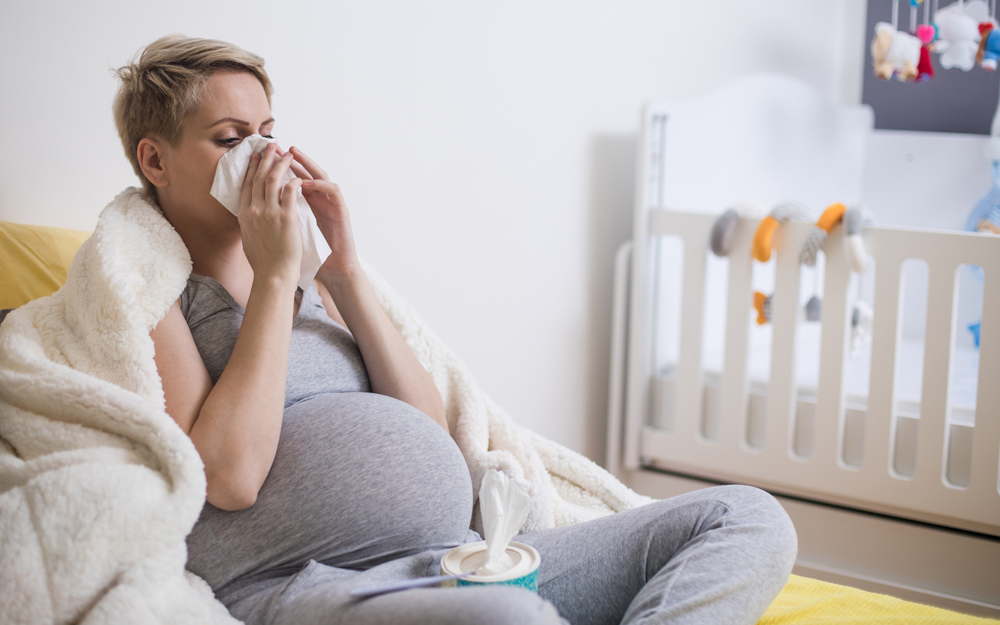COVID-19 (SARS-CoV-2) has been a global concern since its emergence in December 2019, particularly due to its high contagion rate and associated mortality and morbidity. Pregnant women are considered a vulnerable group due to physiological changes associated with pregnancy and have a higher susceptibility to contracting the virus and experiencing severe infection leading to serious outcomes. Furthermore, pregnancy increases the risk of developing severe disease and accompanying complications with other coronaviruses like Severe Acute Respiratory Syndrome (SARS) and Middle Eastern Respiratory Syndrome (MERS). Therefore, extra precaution is recommended to ensure the safety of the mother, the baby, and the caregivers.
What are the signs and symptoms?
As with the general population, the presentation in pregnancy can vary from asymptomatic disease to an array of clinical symptoms. Studies’ most common manifestation in pregnancy is fever and mild respiratory symptoms (cough). Laboratory investigations include increased C-reactive protein (CRP), white cell count, procalcitonin levels, and lymphopenia, along with imaging findings of pneumonia on chest X-ray and CT scan.
Studies reveal that most pregnant women develop mild to moderate disease; however, 5% end up being terminally ill, requiring ICU stay and mechanical ventilation. Those who experience severe disease usually have pre-existing comorbidities.
Asymptomatic cases, on the other hand, provide a challenge in preventing viral spread and increase the risk of exposure for the family and healthcare providers.
How does COVID-19 impact pregnancy?
Reports state that COVID-19 does not significantly impact early pregnancy, and most adverse outcomes are observed in late pregnancy, especially in the third trimester, likely secondary to immunological changes. Serious unfavorable maternal and perinatal consequences are more commonly witnessed in patients with severe COVID-19 disease than in asymptomatic patients. However, perinatal outcomes are similar in those with mild-moderate disease and asymptomatic cases.
Maternal outcomes may include:
- ICU admission
- ARDS and the need for mechanical ventilation
- Placental pathologies (placentitis)
- Intrauterine growth restriction (IUGR)
- Pre-eclampsia
- Premature rupture of membranes
- Preterm labor and delivery
- Stillbirth
- Increased incidence of cesarean section
- Mortality
Clinical data demonstrate that most neonates who tested positive for COVID-19 RNA were either asymptomatic or experienced mild illness.
Neonatal outcomes may include:
- Asymptomatic/mild disease
- Risk of developmental anomalies
- Fetal distress
- Low birth weight
- Respiratory distress syndrome
- Neonatal sepsis
- NICU admission
- Neurodevelopmental delays during the first year of life (especially when exposed during the third trimester).
Prevention, management, and care
Vertical transmission is the virus transfer from the mother to the fetus during pregnancy. However, rare cases of transplacental vertical transmission have been reported in pregnant women with COVID-19 infection. However, sufficient evidence is still needed to establish the risk.
Currently, available studies fail to show traces of the virus in breast milk. So healthcare professionals recommend breastfeeding even in COVID-19-positive mothers as the benefits of breastfeeding outweigh the risk of infection spread.
Infection control measures (proper hand washing, wearing masks, PPE, social distancing, etc.) should be strictly taken by pregnant women. In case of symptoms, the International Federation of Gynecology and Obstetrics (FIGO) recommends replacing antenatal visits with video/teleconsultation. Symptomatic pregnant women should limit contact with family members to avoid exposure. Similarly, avoid contact with those who display symptoms. Infected mothers and healthy neonates do not need to be separated; however, the mother should observe precautions, basic hygiene, and the use of personal protective equipment (PPE) while breastfeeding or handling the baby.
Generally, the management of COVID-19 infection in pregnancy is similar to that in the general population. Mild infections can be dealt with at home using symptomatic/supportive treatment. When hospitalization is necessary, additional management measures are adopted by hospitals, including maternal and fetal monitoring, delivery plan, and a multidisciplinary team approach involving obstetric, pediatric, pulmonology, critical care, and infectious disease specialists and consultants. Antiviral and therapeutic medication usage is decided on an individual basis by the primary physician.
COVID-19 vaccine and pregnancy
The majority of pregnant women are hesitant to receive the COVID-19 vaccine due to a lack of vaccine safety evidence during pregnancy. However, clinical trials have established the safety and efficacy of these vaccines. The US Food & Drug Administration (FDA) approved using the Pfizer-BioNTech-mRNA vaccine in pregnant women in August 2021. Several studies indicate that vaccine administration reduces the risk of infection without increasing the risk of miscarriage. Moreover, antibody transfer was noted in fetuses of vaccinated mothers.
An insight from mamahood
Although most neonates and pregnant women are asymptomatic or develop a mild-moderate disease with COVID-19 infection, precautions should always be taken to reduce exposure during pregnancy, as negative maternal and neonatal outcomes are associated with the infection. The good news is that there is low vertical transmission and a lack of virus in breast milk. COVID-19-positive mothers can continue breastfeeding after taking proper precautions.








